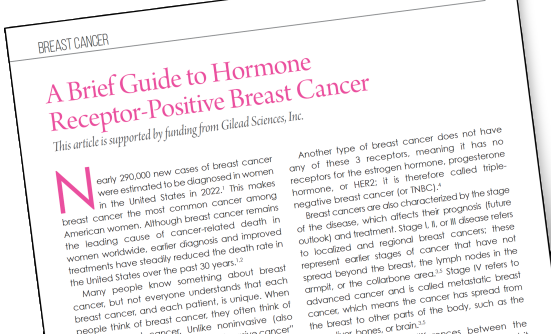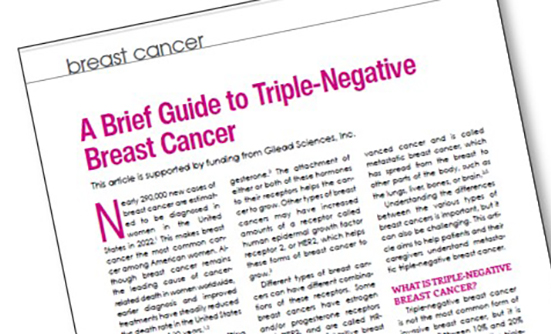Palliative care. Some of you reading those words may be shaking your heads and saying to yourselves, “Never!” But in fact, you probably should have been receiving palliative care since you were diagnosed with stage IV breast cancer, also known as metastatic breast cancer. Why? Because palliative care probably is not what you think it is.
Palliative Care Is About Symptom Management
Palliative care is all about symptom management. It is about preserving the patient’s quality of life or restoring quality of life. Often, oncologists focus on the use of narcotics for pain management, for example. By contrast, a palliative care doctor, who is also usually an oncologist, also considers narcotics, but strives to use them only as a last resort, after trying other options.
Palliative care doctors consider if there are other ways to get the pain under control, such as a nerve-blocking treatment. Or, for example, what other methods are available to improve the patient’s inability to eat, besides telling her (or him) to drink Ensure? Perhaps an appetite stimulant, accompanied by an anti-nausea medicine, would work best.
So involving a palliative care member as an active part of your oncology team early on is one of the smartest things you can do for yourself. If you haven’t yet met with a palliative care specialist, request a consultation.
Key Questions
The key questions that you should be asked at the time you are diagnosed with metastatic breast cancer can greatly help to lead a conversation about palliative care management. These key questions are:
- How much do you know about your metastatic breast cancer?
- How much do you want to know about your metastatic breast cancer?
- What are you hoping for?
- What worries you most?
- What are 3 things that give you joy or gave you joy before the cancer progressed and made you feel sicker?
The answer to these questions can lead to a thoughtful conversation with your medical oncologist, as well as with the palliative care doctor, who is (or should now be) involved in your care at this point. These questions should be asked and discussed often, because the answers will change over time. Having joy in your life is vital and is a visible way to measure at least one element of the quality of life you are experiencing.
Patient Concerns
I conduct 3-day, 2-night retreats for patients with metastatic breast cancer. They are held every 6 months. One is for couples, so the patient brings her spouse or partner; the other is for women who are not in a relationship and they bring a female caregiver who may be their mom, their daughter, or sometimes a sister.
A key question I ask everyone on day 2, with the patients in one room with me, and their loved ones in another room with a different facilitator, is, “Of everything that lies ahead, what is your greatest fear?” Having conducted these retreats for more than a decade now, the answer is always the same—again and again—fear of pain and suffering, and not being able to get the pain under control. The patients fear it, and their loved ones are worried about having to witness it and not being able to do anything about it. Well, the solution is palliative care.
What we have learned is that it isn’t the fear of death that patients focus on, but instead the fear of the dying process, and the fear that the dying process would be horrific. This simply should not be if your oncology care team is focused on your goals, and a key goal is that you want to preserve your quality of life.
Why the Bad Rap?
So how did palliative care get such a bad rap? Probably because when it is discussed with a patient, it is often linked to hospice care. After many lines of unsuccessful therapy, the oncologist may say that, “It’s time to consider hospice and palliative care.” This implies that palliative care is part of hospice care, and although it in fact is, palliative care is also designed to be provided much before a discussion or a need for hospice should ever come up.
Be sure to advocate for yourself that you would like to know more about the palliative care services available to you. Ask for a consultation or, at a minimum, the opportunity to talk with a nurse who is part of the palliative care team, and get a clearer idea of what the team members are all about and when you may want to engage their services.
Difficult Issues
Another strength of palliative care is the opportunity to talk about very difficult issues related to progression of disease, how to decide what your goals of care are, and how they will likely change as time progresses and it becomes harder to keep the cancer under control.
Remember, treatment for treatment’s sake is poor care, and always has been. You will also find that palliative care providers are usually more open about discussing bad news than other providers. They have been trained to be comfortable with this discussion, and they can also help you get comfortable talking about it.
Another benefit is that palliative care providers are able to talk with family members who may not understand what is happening or, perhaps, what your wishes are, and how your wishes are to be honored.
Take Steps Now
It is unfortunate that only few patients with advanced cancer receive palliative care.
Now that you have more accurate information about its purpose, take the steps to engage with palliative care, so that you could benefit from such care yourself, and also raise awareness of the profound benefit palliative care provides—to increase the number of people who are benefiting from this care.
Key Points
- You should have been receiving palliative care since you were diagnosed with metastatic breast cancer
- Palliative care is all about symptom management
- Treatment for treatment’s sake is poor care













